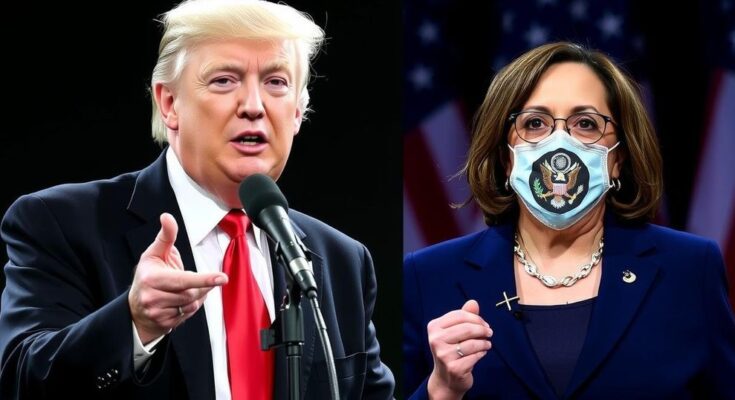As the 2024 election approaches, Kamala Harris and Donald Trump present contrasting closing arguments, with Harris emphasizing unity and a commitment to the nation, while Trump utilizes combative rhetoric aimed at energizing his base. Harris warns against Trump’s divisive nature, implicitly highlighting the threat he poses to democracy, while Trump questions voters’ current satisfaction compared to his presidency. Both campaigns seek to sway undecided voters, with Harris appealing to moderates and Trump rallying those yearning for change.
In the final week leading up to the pivotal 2024 election, Vice President Kamala Harris and former President Donald Trump delivered contrasting closing arguments that underscored the divergent paths presented to American voters. Harris, speaking from the Ellipse near the White House, emphasized her commitment to prioritize the nation above partisan interests, proclaiming that it is not in America’s nature to remain divided. She criticized Trump for his obsession with retribution and personal gains, stating, “Donald Trump has spent a decade trying to keep the American people divided and afraid of each other. That’s who he is. But America, I am here tonight to say: That’s not who we are.” Conversely, at a rally in Madison Square Garden shortly prior, Trump unleashed a vitriolic attack, labeling Harris as a “trainwreck” and making derogatory remarks about Puerto Rico among other matters. His comments were seen as indicative of the harsher rhetoric characterizing his campaign, which is centered on energizing his loyal base and appealing to those dissatisfied with current governance. Trump framed his argument with a stark question: whether voters are better off than they were four years ago, reflecting on the widespread discontent regarding the national direction post-pandemic. Harris’s approach, on the other hand, was marked by a focus on unity and a promise to include diverse voices in her administration, stating, “Unlike Donald Trump, I don’t believe people who disagree with me are the enemy. He wants to put them in jail. I’ll give them a seat at the table.” Her campaign seeks to attract undecided voters, including moderate Republicans, as well as to address economic concerns such as rising grocery prices and housing affordability. As the election date approaches, both leaders are mobilizing their respective bases, contributing to a politically charged landscape rife with contrasting visions of leadership and national identity.
The article highlights the distinct closing arguments made by Kamala Harris and Donald Trump as they approach the 2024 U.S. presidential election. With a week left until election day, their speeches serve not only to energize their supporters but also to sway undecided voters by presenting fundamentally different perspectives on American democracy and leadership. Harris emphasizes unity and moral responsibility, while Trump appeals to grievances and a desire for radical change, portraying his opponent in a highly negative light.
In conclusion, the closing arguments presented by Kamala Harris and Donald Trump illustrate the stark choices facing American voters. Harris positions herself as a unifying candidate focused on the future, while Trump appeals to sentiments of dissatisfaction and a call for aggressive change. As Election Day nears, both candidates strive to solidify their bases while reaching out to undecided voters, further emphasizing the critical nature of this election cycle.
Original Source: www.pbs.org




